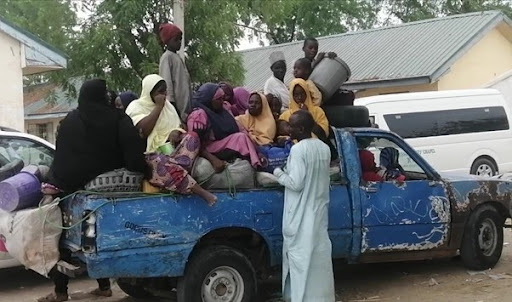Impending Humanitarian Disaster As Borno State Insists On Resettlement
The Borno state government has issued a ban on the distribution of relief materials to resettled IDPs in the state, as it gears up plans to close down all IDP camps in the state despite warnings.

The Borno state government announced a ban on the distribution of food and non-food items to Internally Displaced Persons (IDPs) whom the state is currently in the process of resettling back into their original, and in some cases, new communities. This decision, coming on the heels of several reports which say that resettling IDPs itself might be further putting lives at risk and worsening impoverishment for displaced people, signals an impending humanitarian crisis.
In a statement released to the effect on Dec. 6, the government had said it was deeply committed to helping its people build back their lives, through resilience and helping themselves out of poverty, as they resettle back into their communities.
As part of this effort, the governor explained, it became necessary to wean them off assistance from humanitarian agencies and assistance. It says that food and non-food distribution will only be allowed in IDP camps and amongst IDPs in host communities, for now.
The state government had also earlier announced plans to close all IDP camps in Maiduguri by the end of December 2021. Both its decision to close down the camps, and the ban on distribution of relief materials, have raised concerns among IDPs and humanitarian agencies alike.
How do IDPs feel about the ban and resettlement?
IDPs in Dalori camp, Maiduguri, tell HumAngle that they had stopped receiving relief materials from organizations since October, because the government considered the camp in which they were, already closed. This, they said, has worsened their hardship and starvation.
“We stopped receiving these things and even support from the government since May, the people said the governor said they should stop coming, and that they have officially closed down the camp,” one of them told HumAngle.
They also expressed concerns over being resettled in their communities.
“Some of us women still run into Boko Haram when we go into the forests to look for firewood to sell. They told us that we should never come back there again and that if we were men, we would not have been allowed to leave there alive. So, these people are still operating, and yet they want to resettle us back into our communities. We can’t refuse it, we can only say may Allah bring peace to our land.”
HumAngle had earlier reported the challenges and fears faced by some of the IDPs who had been successfully resettled in May.
Humanitarian agencies
However, humanitarian agencies, as well, have expressed concerns over the resettling of IDPs into new communities. Amnesty International reports that the resettling plans could further endanger lives. It noted that “At least 6 people were killed and 14 injured in Agiri, Mafa Local Government Area on 30 August 2021, one month after they were resettled. Returnees in New Marte, Agiri and Shuwari have experienced multiple attacks by Boko Haram since their resettlement.”
This seems to give legitimacy to the fears of IDPs who told HumAngle they felt unsafe about being resettled.
The report also says that many of the IDPs Amnesty spoke to said they did not have access to essential services such as good water, healthcare, and sanitation.
“Inadequate housing and lack of job opportunities in resettled villages have further compounded their sufferings. At least 41 people died in early October 2021 during a cholera outbreak in the resettled camp in Shuwari, Jere local government area while 20 older people and 21 children were killed by the disease.”
Medicines Sans Frontier, also known as Doctors Without Borders, has released a report that reveals that child malnutrition in Borno state has reached an unprecedented figure, recording having treated 6,609 cases of children who were diagnosed with severe, acute malnutrition. It also suggests that children in wartorn areas or resettled communities remain more vulnerable to starvation and malnutrition.
“While we cannot extrapolate from hospital data a general understanding of people’s nutrition status, this year has clearly shown us that displaced people, in particular, remain extremely vulnerable to peaks of malnutrition and the numbers of malnourished children we are receiving suggest it may be getting worse,” says Shaukat Muttaqi, MSF Head of Mission in Nigeria.
Stoppage of relief materials to affected or vulnerable populations may worsen the situation for children.
Support Our Journalism
There are millions of ordinary people affected by conflict in Africa whose stories are missing in the mainstream media. HumAngle is determined to tell those challenging and under-reported stories, hoping that the people impacted by these conflicts will find the safety and security they deserve.
To ensure that we continue to provide public service coverage, we have a small favour to ask you. We want you to be part of our journalistic endeavour by contributing a token to us.
Your donation will further promote a robust, free, and independent media.
Donate HereStay Closer To The Stories That Matter




